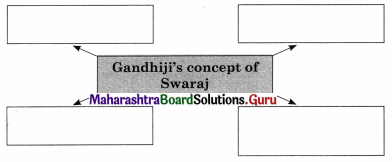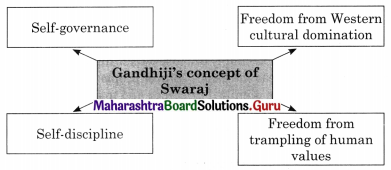Balbharti Maharashtra State Board Class 11 Political Science Important Questions Chapter 2 Liberty and Rights Important Questions and Answers.
Maharashtra State Board 11th Political Science Important Questions Chapter 2 Liberty and Rights
1A. Choose the correct alternative and complete the following statements.
Question 1.
The word ‘liberty’ is derived from the Latin word _________ (libre, liber, libel, little)
Answer:
liber
Question 2.
_________ viewed liberty from a collective perspective. (Rousseau, Hobbes, Bentham, Mill)
Answer:
Rousseau
![]()
Question 3.
_________ rights are granted by the state and are codified in law. (Natural, Moral, Legal, National)
Answer:
Legal
Question 4.
Part _________ of the Indian Constitution deals with fundamental rights. (I, II, III, IV)
Answer:
III
Question 5.
Right to _________ was introduced as fundamental right in 2002. (Education, Information, Property, Privacy)
Answer:
Education
Question 6.
Right to _________ was removed as a fundamental right in 1978. (Education, Information, Property, Privacy)
Answer:
Property
1B. Identify the incorrect pair in every set, correct and rewrite.
Question 1.
(a) Herbert Marcuse – German-American Philosopher
(b) John Locke – American Philosopher
(c) Thomas Hobbes – English Philosopher
(d) Friedrich Hayek – Anglo-Austrian Philosopher
Answer:
(b) John Locke – English philosopher
Question 2.
(a) Isaiah Berlin – Two concepts of liberty
(b) John Stuart Mill – On liberty
(c) Herbert Marcuse – One Dimensional man
(d) Jean-Jacques Rousseau – Eros and Civilization
Answer:
(d) Jean – Jacques Rousseau – The Social Contract or Herbert Marcuse – Eros and civilisation.
![]()
Question 3.
(a) Jeremy Bentham – The greatest happiness of the greatest numbers
(b) Jean-Jacques Rousseau – The General Will
(c) Isaiah Berlin – I am a slave to no man
(d) Mahatma Gandhi – Promoted western education and culture
Answer:
(d) Mahatma Gandhi – Freedom from western cultural domination.
1C. State the appropriate concept for the given statement.
Question 1.
A political ideology whose central theme is based on individualism.
Answer:
Liberalism
Question 2.
Type of liberalism based on the concept of “minimum government”.
Answer:
Classical liberalism
Question 3.
Type of liberalism which advocates a free-market economy.
Answer:
Neoliberalism
Question 4.
Type of liberalism which propounds role of Welfare State.
Answer:
Modern liberalism
Question 5.
The aspect of liberty is expressed by Berlin’s statement “I am my own master”.
Answer:
Positive liberty
![]()
Question 6.
Universal Rights are based on human nature.
Answer:
Natural rights
1D. Answer in one sentence only.
Question 1.
What is national liberty?
Answer:
Freedom from foreign rule i.e., political independence means national liberty.
Question 2.
What does Locke’s concept of liberty focus on?
Answer:
Locke’s concept of liberty focuses on the absence of unreasonable restraints and the freedom of choice.
Question 3.
Who is considered as the ‘Father of the French Revolution?
Answer:
Jean-Jacques Rousseau is considered the ‘Father of the French Revolution.
Question 4.
Which English philosophers considered liberty as a natural right?
Answer:
English philosophers such as John Locke and Thomas Hobbes considered liberty as a natural right.
Question 5.
What were Isaiah Berlin’s two concepts of liberty?
Answer:
Isaiah Berlin’s two concepts of liberty include positive liberty and negative liberty.
![]()
Question 6.
What was Jeremy Bentham’s principle of liberty?
Answer:
Jeremy Bentham’s principle of liberty was ‘the greatest happiness of the greatest numbers.
Question 7.
What forms of liberalism contributed to the concept of negative liberty?
Answer:
Classical and Neoclassical liberalism is contributed to the concept of negative liberty.
Question 8.
Why does Marcuse support state interference in an individual’s life?
Answer:
Marcuse advocates collective control to be essential in community life as a principle of positive liberty and hence supports state interference in the individual’s life.
Question 9.
What is the literal meaning of ‘Swaraj’.
Answer:
‘Swa’ (self) and ‘Raj’ (rule) hence Swaraj implies ‘self-rule’ or self-governance.
Question 10.
What are natural rights?
Answer:
Natural rights are rights that are part are of human nature and reason.
Question 11.
When was the Universal Declaration of Human Rights made?
Answer:
The Universal Declaration of Human Rights was made On 10th December 1948.
1E. Complete the following sentence by using appropriate reason.
Question 1.
John Locke does not advocate unrestrained freedom as –
(a) Liberty means the absence of restraint and freedom of choice
(b) personal interests should be kept aside for social interest.
(c) liberty is a hurdle-less situation.
Answer:
(a) Liberty means the absence of restraint and freedom of choice
![]()
Question 2.
According to Gandhiji, the concept of ‘Swaraj’ was liberty as –
(a) It implied freedom from colonial rule.
(b) It implied social reformation
(c) It gives importance to self-governance and humanitarian values.
Answer:
(c) It gives importance to self-governance and humanitarian values.
1F. Find the odd word in the given set.
Question 1.
Fredrick Hayek, Robert Nozick, Jean-Jacques Rousseau, J. S. Mill
Answer:
Jean-Jacques Rousseau (positive liberty)
Question 2.
Right to Life, Right to Vote, Right to Contest Elections, Right to Criticize the Government.
Answer:
Right to Life (civil right)
Question 3.
Right to Equality, Right to Property, Right to Education, Right against exploitation.
Answer:
Right to Property (not a fundamental right)
2A. State whether the following statements are true or false with reasons.
Question 1.
Right to Property is a Fundamental Right in India.
Answer:
This statement is False.
- The Right to Property was a fundamental right. However, in 1978, by the 44th Amendment Act, this right was removed as a fundamental right.
- At present, the Right to property is a Statutory Right (Article – 300A).
![]()
Question 2.
Liberty and Rights are inseparable.
Answer:
This statement is True.
- Rights help to strengthen liberty. Liberty itself consists of various civil, political, and economic rights.
- Thus, rights and liberty are two sides of the same coin.
Question 3.
National liberty is the foundation of all liberties.
Answer:
This statement is True.
- National liberty refers to freedom from foreign rule.
- True liberty can be enjoyed by individuals only when they exist in an independent, democratic state.
Question 4.
Human Rights are universal.
Answer:
This statement is True.
- Human Rights refer to the rights that people are entitled to simply because they are human beings.
- An individual can achieve his/her full potential only when one is free to make the best use of available opportunities.
- Human Rights are based on the principle of dignity and the inherent worth of an individual.
2B. Complete the concept maps.
Question 1.

Answer:

Question 2.

Answer:

3. Answer the following questions.
Question 1.
Enumerate the fundamental rights in the Indian constitution.
Answer:
Part III (Articles 12 – 35) of the Indian Constitution spells out the Fundamental Rights of Indian citizens. The Constitution guarantees six fundamental rights which are
- Right to Equality
- Right to Freedom
- Right against Exploitation
- Right to Freedom of Religion
- Cultural and Educational Rights and
- Right to Constitutional Remedies.
![]()
Question 2.
Explain Rousseau’s concept of liberty.
Answer:
Rousseau looked at liberty from a collective perspective. According to him, an individual should keep personal interests aside for social interests. His concept of liberty frees the individual from a class-based system and inequality. According to him, inequality is an obstacle to the attainment of liberty. He maintains that liberty frees an individual from the hurdles created by the rise of civil and political society.
He describes two hurdles on liberty:
- One which prohibits an individual to think about public interest
- One is created due to inequality in society.
Rousseau did not consider liberty as a natural right as advocated by Hobbes and Locke. He believed that society comes together to protect the life and interest of the individual. Therefore, he gave more importance to emancipation from social inequality. He also stressed the freedom of choice and availability of favorable conditions in the concept of liberty. He believed that obedience to moral laws will enhance liberty. According to Rousseau, the state is a sovereign power that represents the ‘General Will’. Hence he supports the idea of state control over the individual.
Question 3.
Explain the Indian Concept of Liberty.
Answer:
Traditionally, in India liberty is a spiritual idea signifying ‘salvation or emancipation from the cycle of birth and rebirth’. However, in modern times, liberty is understood as liberation from social constraints.
In British India, the concept of liberty was accepted as
- Laws were made by the British for the protection of individual rights e.g., the law for the abolition of Sati.
- Views of great reformers like Mahatma Phule, Dr. Ambedkar. They believed liberty means freedom from caste inequality as well as from social constraints i.e., the liberation of lower castes from the domination of the upper castes.
- Mahatma Gandhi accepted the concept of Swaraj as liberty. This was a comprehensive concept that included freedom from British rule and western cultural domination. It gives more importance to self-governance, self-discipline, and human values.
Question 4.
List the human rights enumerated in the U.D.H.R.
Answer:
U.D.H.R. was made on 10th December 1948. It consists of 30 articles that elaborate on civil, political, social, and economic rights. The U.D.H.R. expresses a strong belief in the principles of liberty, equality, justice, and fraternity. It is an attempt to eliminate forms of injustice and discrimination so that everyone is entitled to live with dignity and respect.
![]()
U.D.H.R. includes
- Civil rights such as the right to life, right to liberty, right to freedom of thought and expression right to religious freedom, etc.
- Political rights such as the right to franchise, to political participation, to criticize the government, etc.
- Social rights such as the right against any form of denial, injustice, exploitation, torture, etc. It also includes the right to health, education leisure, etc.
- Economic rights such as the right to work, right to a livelihood, right to just and humane work conditions, etc.
4. Answer the following in detail with reference to the given points.
Question 1.
Elaborate the concept of Rights –
(i) Civil Rights
(ii) Political Rights
Answer:
(i) Civil Rights: These rights are personal rights of the individual according to reasonable limits laid down by the law. This includes universally recognized rights like the right to
- Freedom of thought and expression.
- Freedom of religion, conscience, and worship
- Freedom of movement, association, and assembly
- Freedom from fear and want.
(ii) Political Rights: These rights are available only to citizens in a democracy. They include
- right to vote
- right to stand for elections
- right to hold public office
- right to hold public views and to criticize the government.
![]()
Activity
Find out various Supreme Court cases that have focused on the rights and liberty of Indian citizens.
Answer:
- Supreme Court declares the Right to Privacy as a fundamental right that is intrinsic to life and liberty. This was declared in the K.S. Puttaswamy vs Union of India by a bench of judges headed by the then Chief Justice J. S. Khehar.
- Supreme Court in September 2018 decriminalized gay sex (Section 377). This was a vestige of British colonial rule.
- Supreme Court set aside ‘instant talaq’ (talaq-e-bidat) on the basis that it violated constitutional provisions. This was on a petition by Shayara Bano (2016).